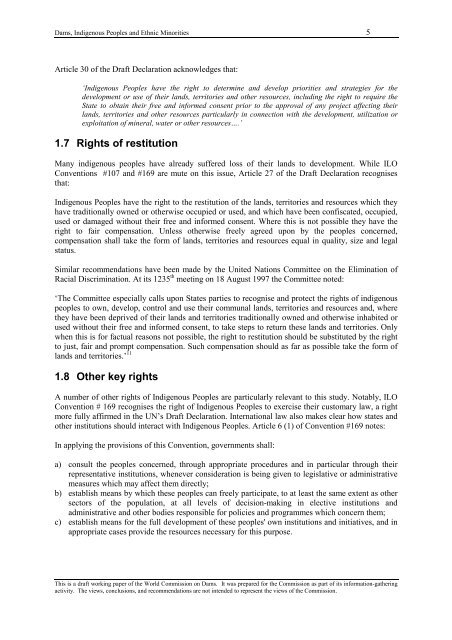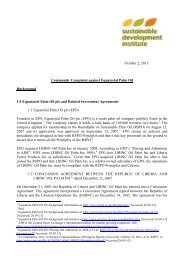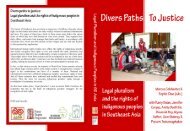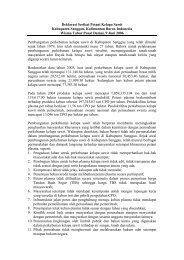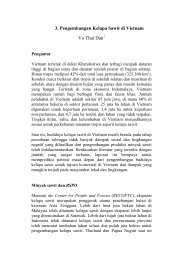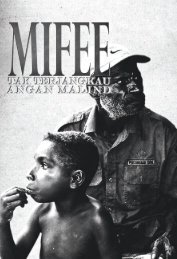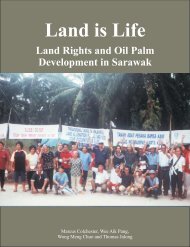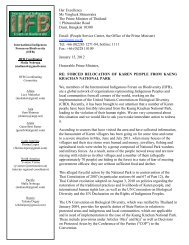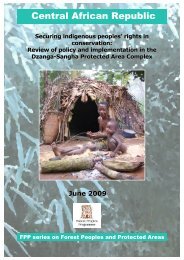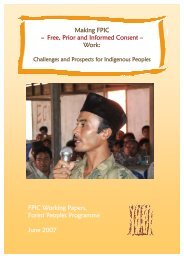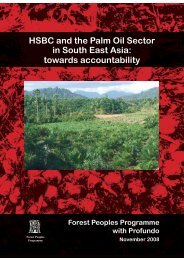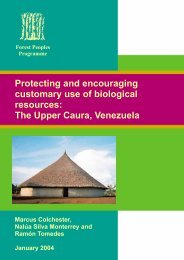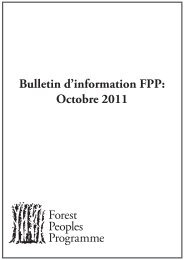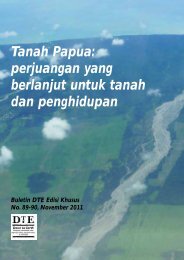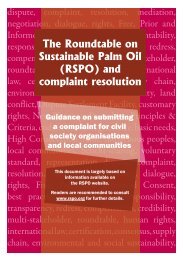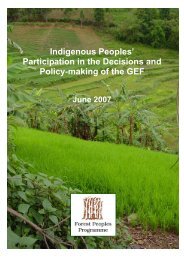Thematic Review II.2: Dams, Indigenous Peoples and Ethnic Minorities
Thematic Review II.2: Dams, Indigenous Peoples and Ethnic Minorities
Thematic Review II.2: Dams, Indigenous Peoples and Ethnic Minorities
You also want an ePaper? Increase the reach of your titles
YUMPU automatically turns print PDFs into web optimized ePapers that Google loves.
<strong>Dams</strong>, <strong>Indigenous</strong> <strong>Peoples</strong> <strong>and</strong> <strong>Ethnic</strong> <strong>Minorities</strong> 5<br />
Article 30 of the Draft Declaration acknowledges that:<br />
‘<strong>Indigenous</strong> <strong>Peoples</strong> have the right to determine <strong>and</strong> develop priorities <strong>and</strong> strategies for the<br />
development or use of their l<strong>and</strong>s, territories <strong>and</strong> other resources, including the right to require the<br />
State to obtain their free <strong>and</strong> informed consent prior to the approval of any project affecting their<br />
l<strong>and</strong>s, territories <strong>and</strong> other resources particularly in connection with the development, utilization or<br />
exploitation of mineral, water or other resources….’<br />
1.7 Rights of restitution<br />
Many indigenous peoples have already suffered loss of their l<strong>and</strong>s to development. While ILO<br />
Conventions #107 <strong>and</strong> #169 are mute on this issue, Article 27 of the Draft Declaration recognises<br />
that:<br />
<strong>Indigenous</strong> <strong>Peoples</strong> have the right to the restitution of the l<strong>and</strong>s, territories <strong>and</strong> resources which they<br />
have traditionally owned or otherwise occupied or used, <strong>and</strong> which have been confiscated, occupied,<br />
used or damaged without their free <strong>and</strong> informed consent. Where this is not possible they have the<br />
right to fair compensation. Unless otherwise freely agreed upon by the peoples concerned,<br />
compensation shall take the form of l<strong>and</strong>s, territories <strong>and</strong> resources equal in quality, size <strong>and</strong> legal<br />
status.<br />
Similar recommendations have been made by the United Nations Committee on the Elimination of<br />
Racial Discrimination. At its 1235 th meeting on 18 August 1997 the Committee noted:<br />
‘The Committee especially calls upon States parties to recognise <strong>and</strong> protect the rights of indigenous<br />
peoples to own, develop, control <strong>and</strong> use their communal l<strong>and</strong>s, territories <strong>and</strong> resources <strong>and</strong>, where<br />
they have been deprived of their l<strong>and</strong>s <strong>and</strong> territories traditionally owned <strong>and</strong> otherwise inhabited or<br />
used without their free <strong>and</strong> informed consent, to take steps to return these l<strong>and</strong>s <strong>and</strong> territories. Only<br />
when this is for factual reasons not possible, the right to restitution should be substituted by the right<br />
to just, fair <strong>and</strong> prompt compensation. Such compensation should as far as possible take the form of<br />
l<strong>and</strong>s <strong>and</strong> territories.’ 11<br />
1.8 Other key rights<br />
A number of other rights of <strong>Indigenous</strong> <strong>Peoples</strong> are particularly relevant to this study. Notably, ILO<br />
Convention # 169 recognises the right of <strong>Indigenous</strong> <strong>Peoples</strong> to exercise their customary law, a right<br />
more fully affirmed in the UN’s Draft Declaration. International law also makes clear how states <strong>and</strong><br />
other institutions should interact with <strong>Indigenous</strong> <strong>Peoples</strong>. Article 6 (1) of Convention #169 notes:<br />
In applying the provisions of this Convention, governments shall:<br />
a) consult the peoples concerned, through appropriate procedures <strong>and</strong> in particular through their<br />
representative institutions, whenever consideration is being given to legislative or administrative<br />
measures which may affect them directly;<br />
b) establish means by which these peoples can freely participate, to at least the same extent as other<br />
sectors of the population, at all levels of decision-making in elective institutions <strong>and</strong><br />
administrative <strong>and</strong> other bodies responsible for policies <strong>and</strong> programmes which concern them;<br />
c) establish means for the full development of these peoples' own institutions <strong>and</strong> initiatives, <strong>and</strong> in<br />
appropriate cases provide the resources necessary for this purpose.<br />
This is a draft working paper of the World Commission on <strong>Dams</strong>. It was prepared for the Commission as part of its information-gathering<br />
activity. The views, conclusions, <strong>and</strong> recommendations are not intended to represent the views of the Commission.


